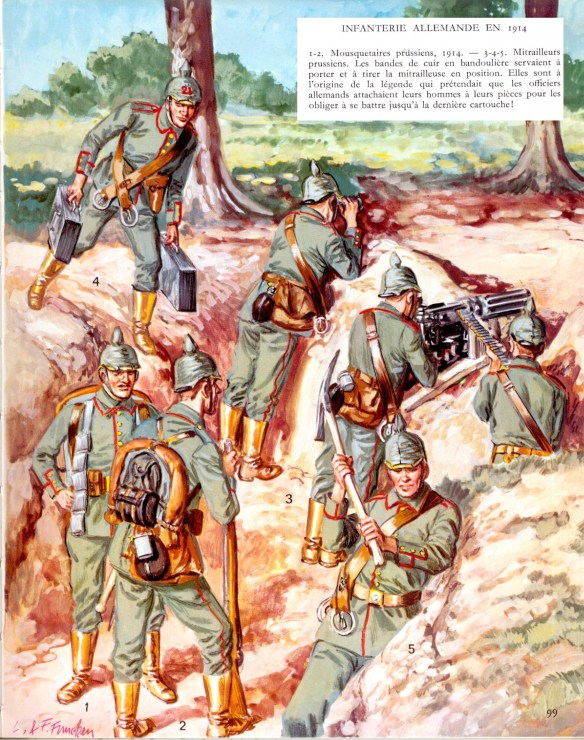
The emphasis placed here on conscription as the key underlying principle for the mobilization of the German army and the front-line experience seems to downplay the role of voluntary enlistment, at least for the early weeks and months of the conflict. According to a popular perception, Germans welcomed the war with a wave of patriotic enthusiasm, and hundreds of thousands of volunteers from all walks of life rushed to the colours in the process. In 1914, figures of up to 1.5 million volunteers circulated in the public. A closer examination of the historical record, however, has revealed the mythological elements of this perception. Enthusiastic crowds surely gathered upon the declaration of war, and the public spirit of belligerence did motivate many young people to volunteer. It did, however, also produce disappointment among those older men who were not yet called up during the early days of the war. But these public outpourings of enthusiasm were largely confined to the big cities, and to Berlin in particular. Most farmers and farmwomen in the countryside, Catholics in provincial towns and class-conscious Social Democratic workers reacted rather with despair, depression and political reservation to the declaration of war. Even in Berlin, enthusiasm was largely confined to the (educated) middle classes. Consequently, high-school and university students, but also other strata of the urban middle classes were massively overrepresented among those who volunteered. And the actual numbers of volunteers were not massive, at least when measured against the public and private pressure to enlist that their peers exerted on young men from the patriotic middle classes, and against the subsequent mythological exaggerations of the Augusterlebnis, the ‘spirit of August 1914’. In the first ten days of mobilization, 260,672 men volunteered in Prussia, of whom 143,922 were actually recruited for the army. For the whole of August, the number of recruited volunteers all over Germany can be estimated at 185,000. These are still substantial figures. But they have to be interpreted against the backdrop of the overall strength of the German army, which shot up from the peace-time size of 0.8 million to 2.9 million men in August 1914. And this dramatic increase was largely achieved by the means of conscription.
General conscription as the key organizing principle of the German military did, at least during peace time, have both a unifying and a levelling impact. Unifying, as an extended period of military service to the fatherland helped to generate ‘an awareness of national belonging’. The military as the ‘school of the nation’: this popular slogan was to some extent an idealized notion based on a national-conservative ideology. But it also captured important side effects of conscription, as young men from diverse regional and also denominational backgrounds served together in one barrack and thus had a tangible experience of the wider national framework they lived in. Conscription was a great leveller, as military service drew together men from different social backgrounds and forced them to live in rather modest material circumstances. There were, however, exceptions from the implicitly egalitarian arrangements for general conscription, and they proved to have a decisive impact on the perceptions and motivations of ordinary soldiers during the war. As had been the case in the Prussian army, young men with a high-school diploma in Imperial Germany could sign up for military service as a one-year volunteer (Einjährig-Freiwilliger). This would cut the period of service to half and allowed them to lodge privately instead of staying in overcrowded barracks with their tight discipline and mediocre diet. The ‘one-yearers’ had to pay for their own subsistence and also their equipment, though, indicating that this was a privilege not only based on formal education, but also on affluence. Consequently, only offspring from well-to-do middle-class families could afford to opt for this form of service.
Service as a one-year volunteer was not only convenient but allowed an individual to bypass many of the hardships of conscription. For a sizable minority of the ‘one-yearers’, it also permitted them to qualify for and be accepted as a reserve officer. In this much sought-after position, they could extend the patriotic honour and prestige of military service into their civilian life. It was fairly common that reserve officers wore their uniform in public, and the military rank offered additional prestige when they participated in bourgeois forms of sociability. The privileges granted to young men from the educated middle class, however, intensified the widespread perception of injustice and inequality among ordinary soldiers during the war. This was due to the continuing role of higher education certificates for the replenishing of the ranks of the officer corps. Already during the first year of the war, the active prewar officer corps had suffered major losses. Yet while the military authorities were well aware of how useful it could be to promote NCOs with frontline experience, it remained very difficult to rise to the rank of reserve lieutenant without a one-year-volunteer certificate. A mere 91 NCOs without this certificate were promoted to the rank of officer between 1914 and 1918 in the Bavarian army, mostly for acts of extreme bravery. Instead, NCOs who performed the duties of officers without the certificate were made Feldwebelleutnant (sergeant-lieutenant). Thus, they still ranked below the lowest rank of reserve officer and were only second-class officers, a fact that contributed to the widespread perception that the officer corps was a separate caste and endowed with unjustified privileges by the monarchical state.